Getting the Best Out of a Joint Venture Real Estate Development
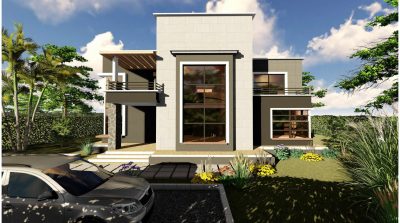
The ultimate goal for every landowner is to put it to commercial use by either developing or farming it for their economic gain. The most preferred in modern Kenya is the construction of either residential or commercial development. However, land development is a capital-intensive commitment that requires the landowner to be financially stable, in addition to having expertise in real estate development. This is where joint venture in real estate development comes in handy.
The joint venture arrangement brings together a combination of two or more players – the landowner and the real estate developer. It is a business arrangement in which two or more parties agree to pool their resources for the purpose of accomplishing a specific task.
The landowner brings onboard the land for the development and the developer brings onboard the funds needed for the development and the development expertise. The two entities co-own the project at percentages agreed at the signing of the joint venture agreements.
Joint ventures have over the years become very popular, and this is because of the benefits that they come with. Some of the benefits of getting into a joint venture include pooled resources which means a larger scope of expertise and finances. There is also the opportunity to gain knowledge and expertise from each other during the implementation of the project thereby increasing productivity. Joint ventures can also present the opportunity to access previously inaccessible markets, new markets or new sectors and both parties share the risk in case of any losses or liabilities.
As with everything, joint ventures also come with potential risks. The most common one is reputational risk which may result from failing to meet stakeholders’ expectations or from entering into a joint venture with a partner that does not share the same values. Imbalance in resource allocation, conflict in management style and failure to achieve intended plans resulting in losses are other risks associated with joint venture developments.
Here are some tips that a land owner should consider when entering into a joint venture agreement for real estate development:
Choose a developer with a proven track record
Having the right partner with a solid reputation and a proven track record in property development sets you on the right footing. Real estate developers like Safaricom Investment Cooperative have completed developments that one can go and visit. A developer with such a track record is always better than one who is yet to complete a project.
Form a special purpose vehicle with the developer
Creating a special purpose vehicle will ensure that both partners are shareholders and signatories. This ensures that your interests are taken care of and you are protected. With this special purpose vehicle, you are also able to spread any risk that might arise from undertaking real estate investment.
Get legal assistance in understanding the process
Every proper partnership entails signing of contracts and documents. Sometimes, as a land owner, you might be blinded by the benefits you are being offered and overlook some details that might cost you. It is important that before getting into any joint venture agreement, or before signing any document, you seek the counsel of a legal expert. A legal expert will take you through the document, explain to you in detail what you are getting from the partnership, your responsibilities and explain the risks you might be exposing yourself to before signing. This cushions you from any future misunderstandings and ensures that you are fully aware of what you are getting into.
Be a present participant in the development
When getting into a joint venture, ensure you are present in every step of the process. Being present during the different phases of the project implementation gives you a full picture of the project. This also ensures that both parties- the landowner and the developer – are able to deliver on their promises, ensure quality standard and meet clients’ needs.
Good and reliable joint ventures have resulted in impeccable projects such as the Zaria Village by Safaricom Investment Co-operative and Palm Ridge Limited in Kiambu County. The Zaria Village is a gated family oriented community comprising of 337 quarter acre serviced plots and is centrally located, making it easily accessible from Nairobi Central Business District. The development also boasts of the state-of-the-art security, internal cabro roads, connection to electricity and water as well as a jogging track, club house and a swimming pool for fitness enthusiasts. Amenities at Zaria Village are well taken of and guarantee a homeowner peace of mind.
Newspaper Coverage On Daily Nation, June 27, 2022
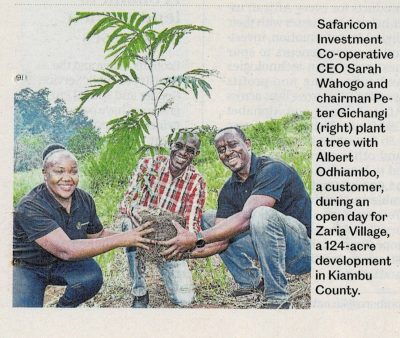
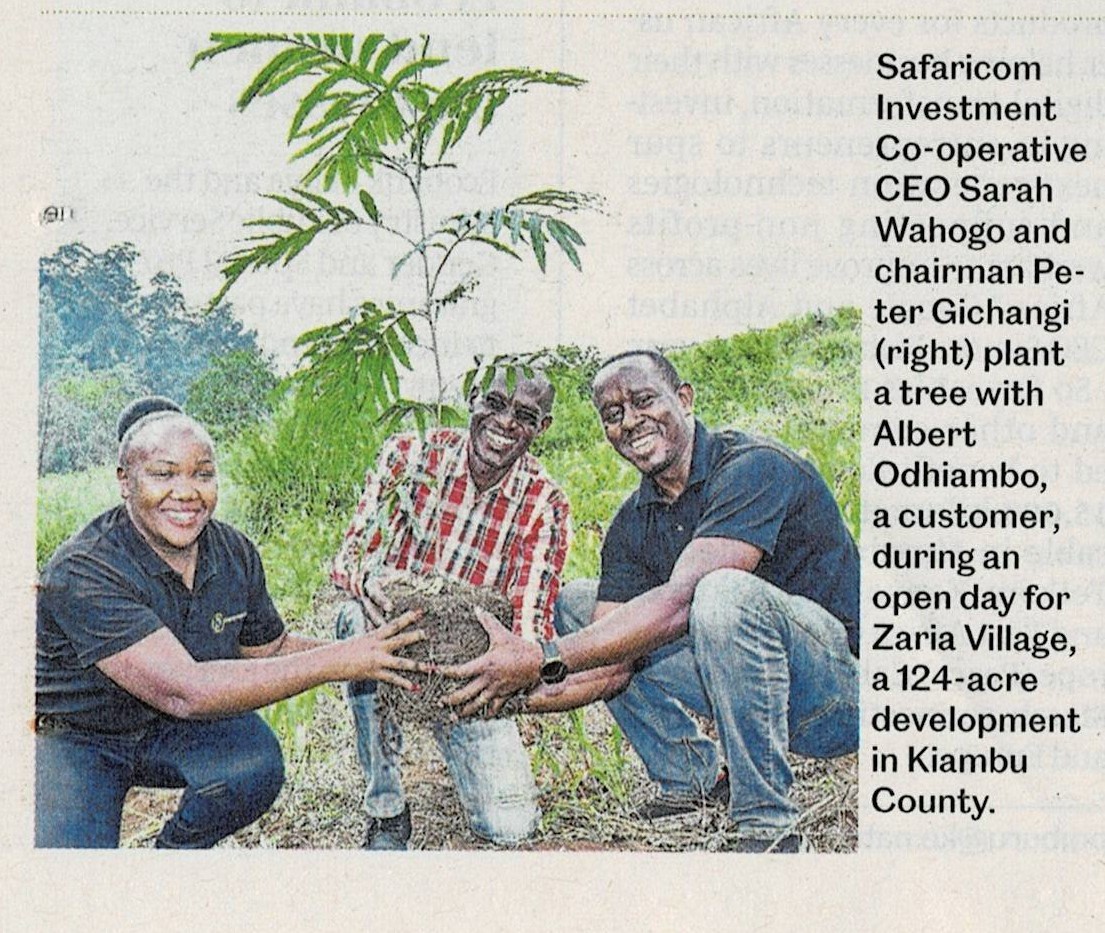
Newspaper Coverage On The Star, June 27, 2022
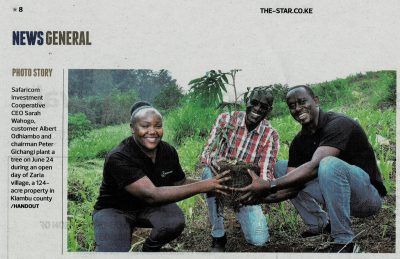
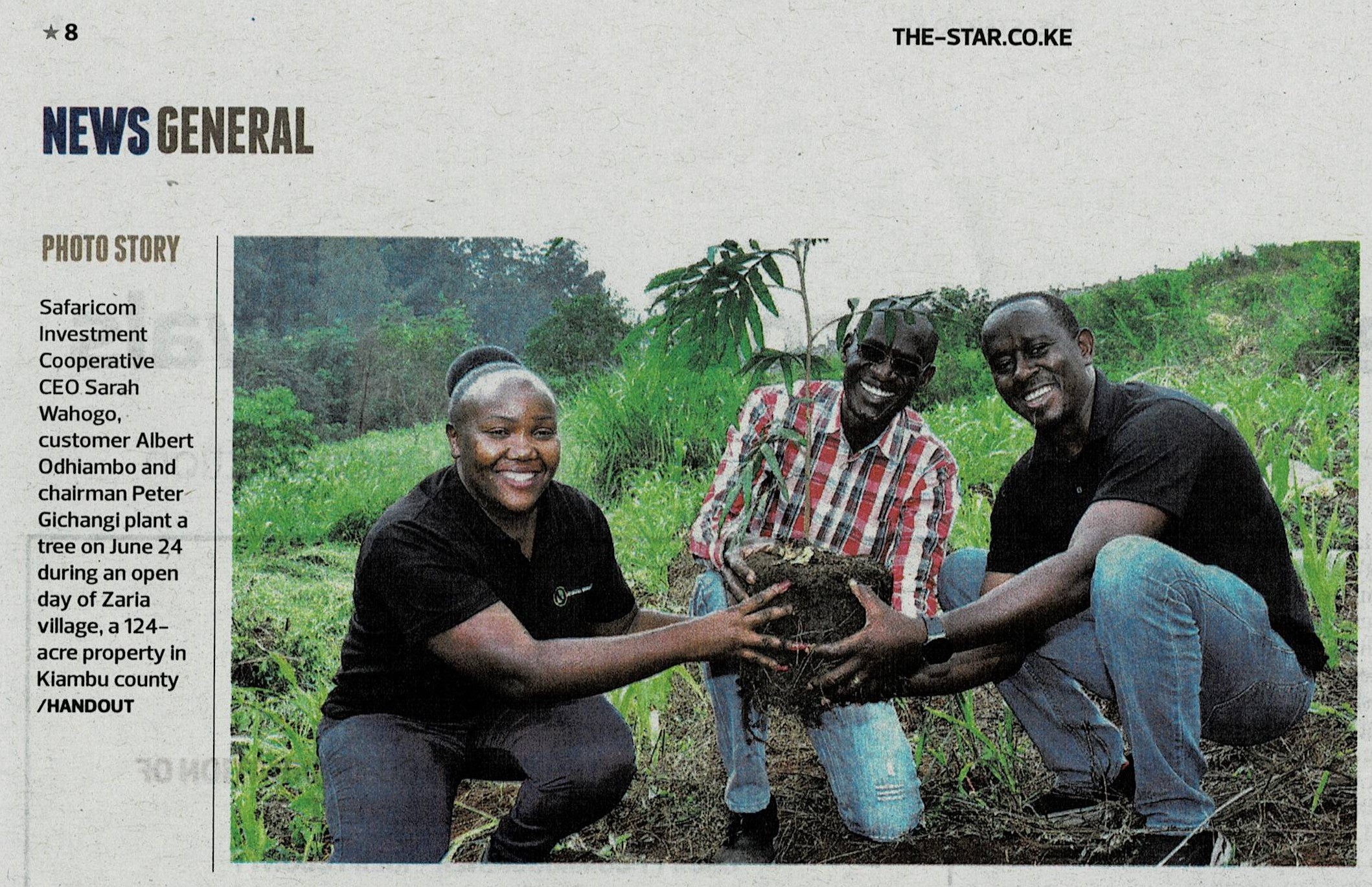
Newspaper Coverage On The Nairobian, June 17, 2022
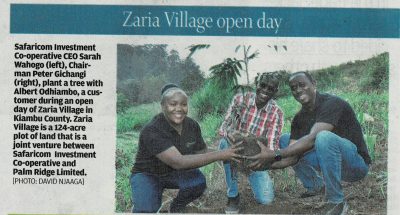
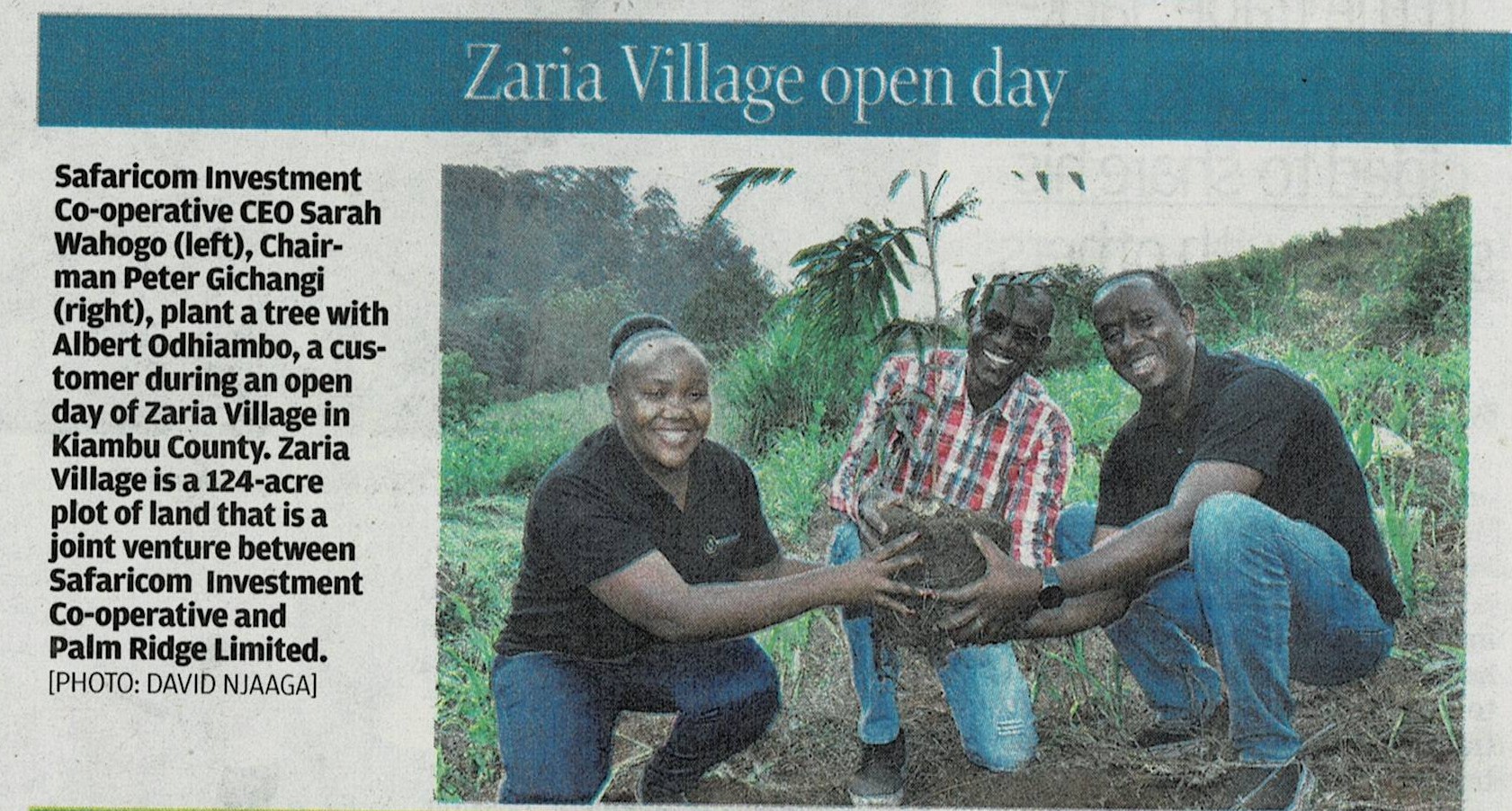
Safaricom Investment Co-operative Breaks Ground for The Zaria Village
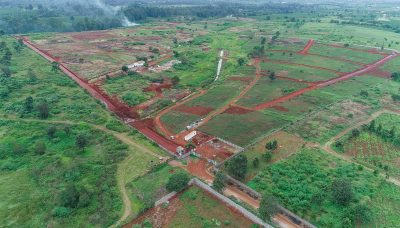
The Zaria Village By Safaricom Investment Cooperative
On Saturday 14th September 2019, Safaricom Investment Cooperative (SIC) held their open day at The Zaria Village Grounds in Kiambu County, where among other activities, a groundbreaking was done at one of the 331 plots which are up for sale.
The groundbreaking typically signifies the readiness of commencement of building, with bush clearing and planting of trees for the hedges almost nearing completion.
Speaking at the event, Peter Gichangi, who serves as the board chairman and director of the Zaria village assured investors that infrastructure will be ready within six months, adding that they need not worry about contractors, as SIC will do their best to ensure they get effective and reliable service.
“We bought the land three years ago when it was still under Palm Ridge. Since then, we have been receiving constant updates from the developers during each stage of the process,” says Ms Esther Mwangi who is among the first people to invest in the project.
In addition, the early investors were consulted when SIC was coming up with the four different house designs that will be constructed in the Zaria Village.
Each 1/4 acre plot is going at an initial cost of Kshs 6.95 million with the highest price at Kshs 7.35 Million. The project targets the middle and upper-middle-income earners, with an extension to the Kenyans in diaspora looking to build homes in Kenya.
Safaricom Investment Co-operative has partnered with Palm ridge, together with mortgage offering banks such as KCB and CBA, to ensure The Zaria village project attains completion within the set timelines.
Digging Into Safaricom Investment Co-operative’s Latest Project “The Zaria Village”
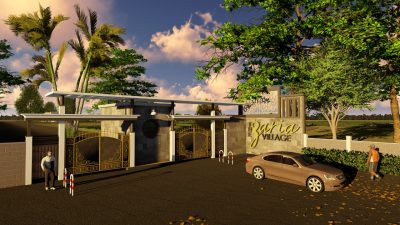
The Zaria Village By Safaricom Investment Cooperative
Safaricom Investment Co-Operative has been in existence since 2009, delivering a total of 129 projects.
Over the ten years, the co-operative has been able to remit upto 42% annual returns to its investors, clients and 4200 members. Their total investment over a period of ten years amounts to Kshs 20 billion.
With their recently unveiled project dubbed The Zaria Village, SIC aims to empower prospective investors and clients by availing the housing units below market value.
Current prices for 1/4 acre plots stand at Kshs 6.95 million, with the highest price at Kshs 7.35 million.
According to Safaricom’s Senior Manager for Strategy Peter Gichangi, who also serves as the board chairman and director of Zaria Village, the major challenge has always been the unique demands for each client but The Zaria Village curbs this by offering four different housing options; The Zara, The Zaira, The Zayana and The Zazi. Each of these units has a different design, although with limiting modifications.
 The Zaria Village Club House
The Zaria Village Club House
One can do modifications as they wish on the interiors, but the only modification they can do on the exterior is the addition of an attic.
In order to penetrate all the possible markets, he says the uptake of SIC has been mostly through direct sales, previous clients and Kenyans in the diaspora.
Mr Peter is confident that title deeds for The Zaria Village will be available within the first thirty days of purchase. All the necessary infrastructure including perimeter walls, drainage systems, tarmac roads and solar street lighting will be ready within six months.
Safaricom Investment Co-operative Unveils The Zaria Village
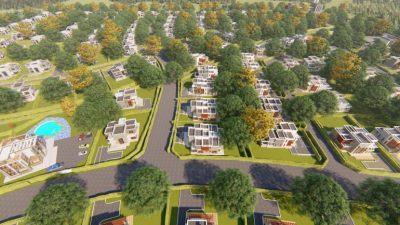
The Zaria Village By Safaricom Investment Cooperative
Safaricom Investment Co-operative (SIC) has launched The Zaria Village, a gated family-oriented real estate project.
Located in Kiambu County, with close proximity to shopping malls such as the Thika Road Mall, International schools and state of the heart hospitals, The Zaria village occupies 124 acres of land, subdivided into 331 plots, each ¼ of an acre.
Safaricom Investment Co-operative has partnered with Palm ridge, together with mortgage offering banks such as KCB and CBA, to ensure The Zaria village project attains completion within the next six months.
Each plot is going at an initial cost of Kshs 6.95 million with the highest price at Kshs 7.35 Million. The project targets the middle and upper-middle-income earners, with an extension to the Kenyans in diaspora looking to build homes in Kenya.
 Launch of The Zaria Village at Capital Club East Africa
Launch of The Zaria Village at Capital Club East Africa
Interested investors will choose from four different house plans dubbed The Zara, The Zaira, The Zayana and The Zazi, with each of the designs having a unique interior and exterior.
Apart from residential units, the Zaria village will also have two recreational areas; by the river and by the Lake Zaad, a clubhouse, spa, a 30-metre swimming pool, an education centre and a mini shopping complex.
Moreover, early investors will get a 5% discount on the land purchase price.
There will be an open day on 14th September 2019, where potential clients will access the plots, plans and location.
SIC was set up in 2009 under the cooperatives Act Cap 490 to pursue investments in real estate, private equity, agribusiness, and quoted securities, and has 129 projects already in the market which translates to 8000 project units in form of land and housing.